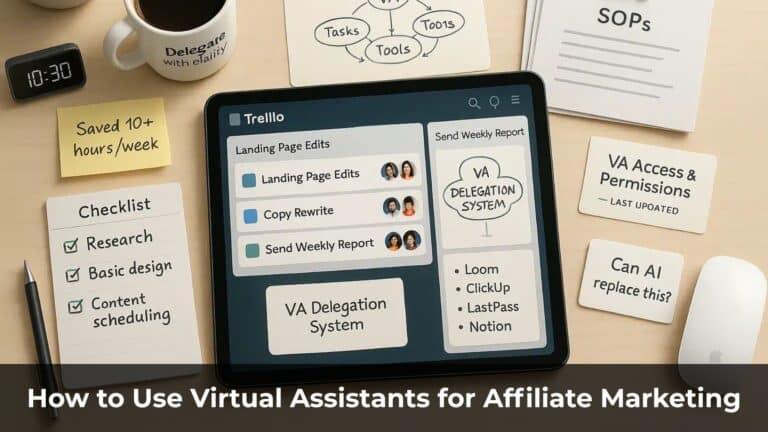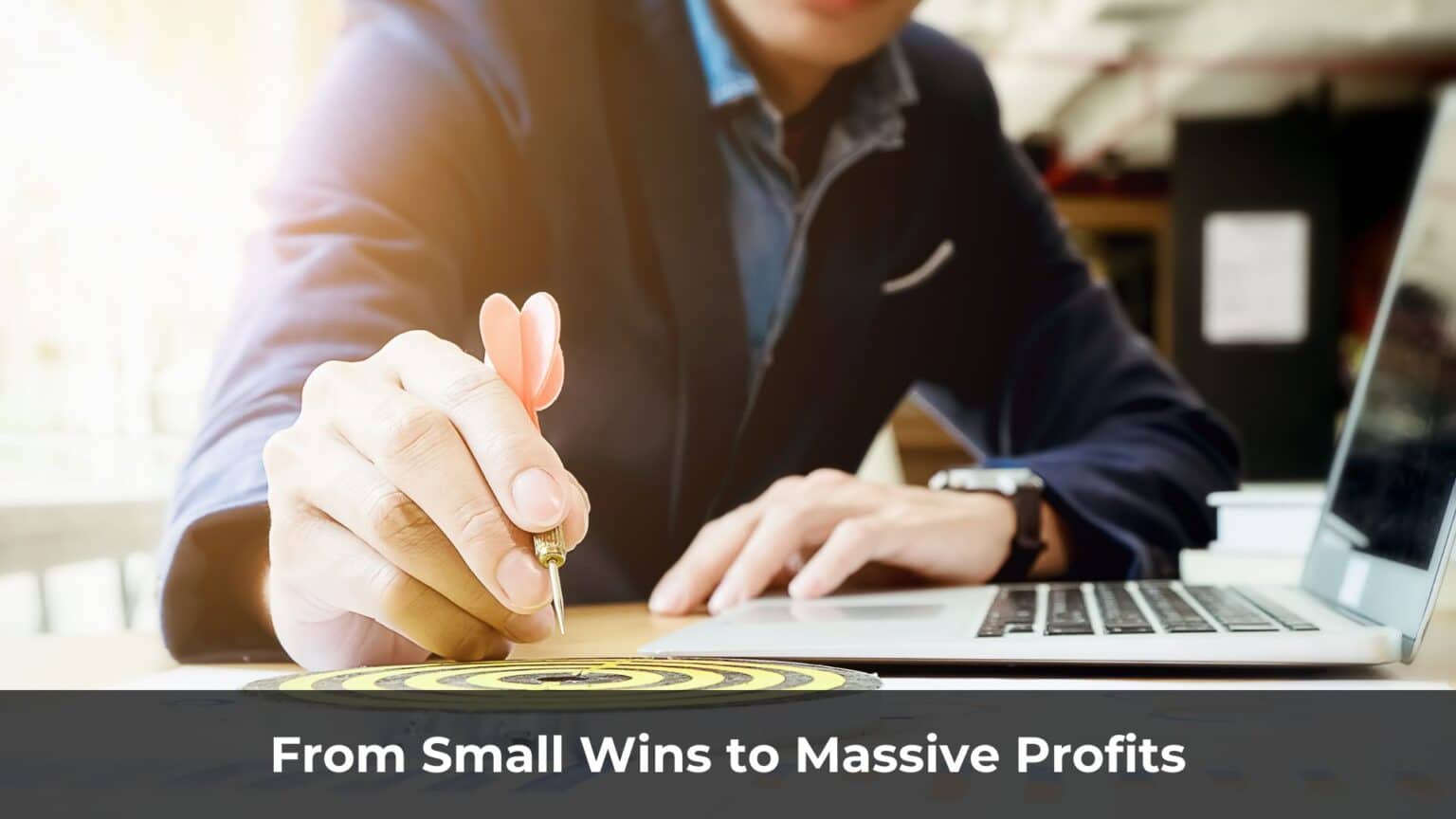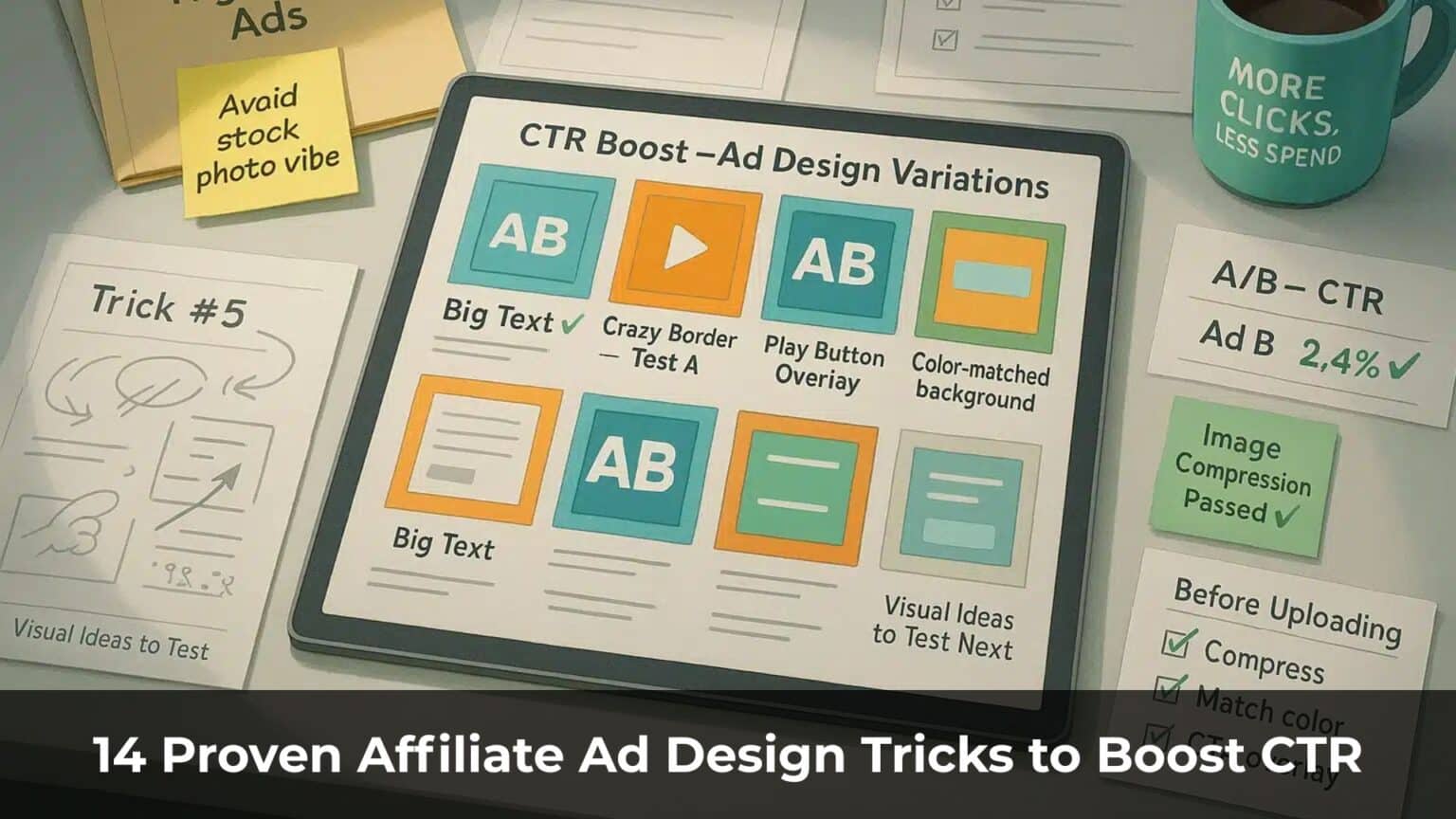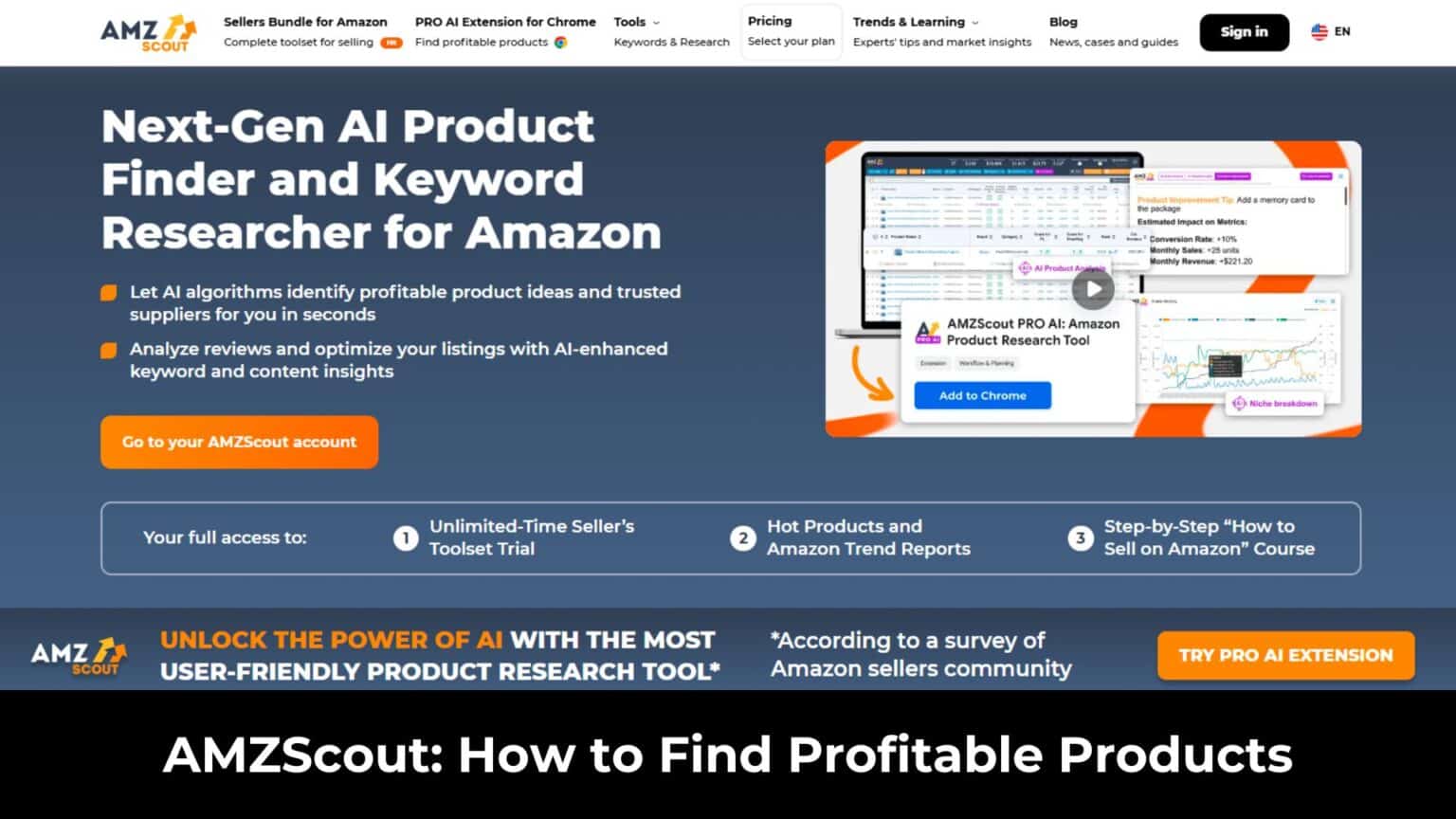Let’s take chess as an example.
Two players start at age 15.
Both spend thousands of hours practicing.
They study openings, analyze games, play online, and compete in tournaments.
Fast forward to age 25 — one remains average, while the other becomes a national master.
Why?
We’re not talking about raw talent or a sky-high IQ.
Both received proper training. Both were passionate. Both worked hard.
The difference wasn’t how much they practiced — but how they practiced.
More hours don’t always lead to better results. More effort doesn’t guarantee more success.
The stronger player didn’t play more — he played smarter.
He stepped back, saw the bigger picture, identified his weaknesses, and trained with intention.
That’s how it works in chess.
And affiliate marketing? It’s no different.
Table of Contents
ToggleWhy Hard Work Alone Won’t Cut It in Affiliate Marketing
I’ve seen countless affiliate marketers spend an entire year grinding… and still go nowhere.
It’s not because they’re lazy.
They show up every day and put in the hours.
But when you look at their results — flat income, failed campaigns, endless resets — you realize the core issue:
They’re busy, but not effective.
They’re doing more, not doing what matters.
They rarely stop to assess the bigger picture.
They don’t ask: “Is this actually moving me forward?”
Many people confuse activity with progress.
They check tasks off fast, hustle non-stop — and assume they’re improving.
But are they?
…
Imagine you run a shoe factory producing 200 pairs a day.
You optimize your machines, hire more workers — now you’re making 400.
Sounds great, right?
But what if the market only wants 200 pairs?
What if your designs don’t sell?
Then you’re just speeding up… in the wrong direction.
And that’s exactly what happens in affiliate marketing.
Some marketers go all in on media buying, jump from tool to tool, copy campaigns they find in spy tools — but never pause to think independently.
So what does it mean to work effectively?
- It means knowing what to prioritize.
- It means optimizing the right thing at the right stage.
- It means knowing when to stop a campaign — and when to scale it.
Working smart doesn’t mean doing less.
It means doing what counts — at the right time.
In affiliate marketing, the biggest difference isn’t how many hours you work — it’s the perspective you operate from.
Are you stuck inside the machine…
or stepping back to see how the machine works?
Super Affiliates aren’t just harder workers.
They think in systems — and that changes everything.
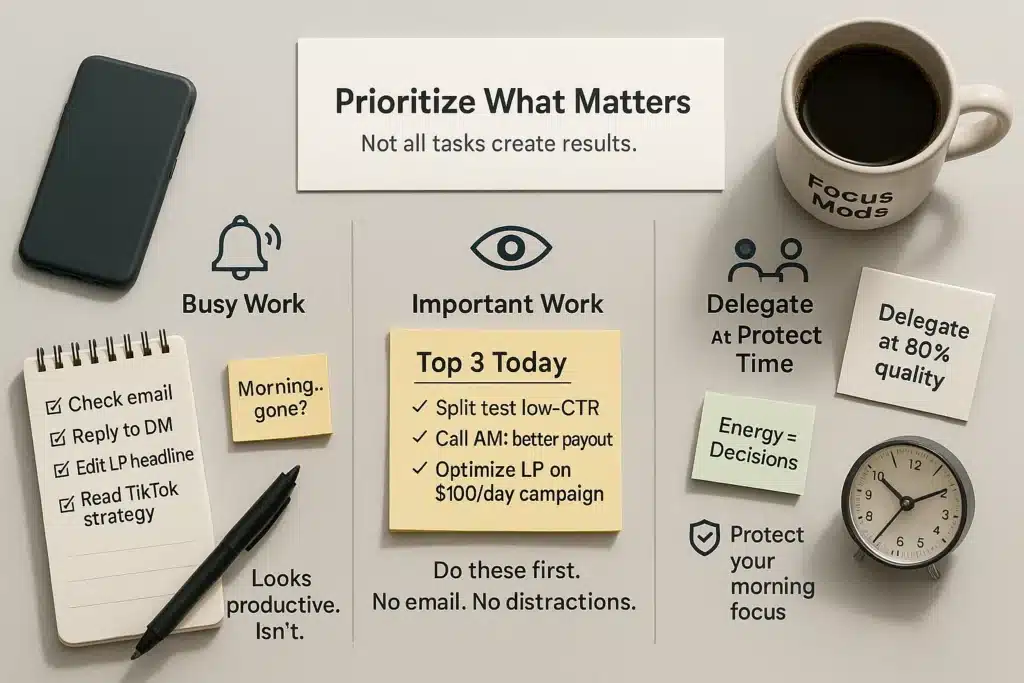
How to Prioritize the Tasks That Drive Real Affiliate Profits
I get it — you’re busy.
We all are.
But success in affiliate marketing doesn’t come from checking off the most tasks.
It comes from choosing the right tasks.
And here’s the trap most people fall into:
They do what’s easy, just to feel productive.
You reply to emails.
Tweak some copy on your landing page.
Skim a new TikTok strategy article.
Boom — it’s already noon.
What didn’t get done?
- You didn’t run a split test for the campaign burning $100/day.
- You didn’t rewrite the low-CTR ad headline.
- You forgot to call your affiliate manager to negotiate a higher payout.
And those are the tasks that actually make you money.
Here’s a habit that changed everything for me:
Every morning,
I write down the 3 most important tasks of the day — only 3.
Then I do those before anything else.
No social media.
No emails.
No distractions.
Because mornings are when your brain is sharpest — and if you don’t protect that time, the world will steal it from you.
Notifications. Messages. News. Drama. Demands from others.
I’m also ruthless about delegation.
If someone can do a task 80% as well as I can, I hire them and let them handle it.
I don’t need to do everything.
I need to protect my energy for high-leverage decisions — the ones only I can make.
That’s how I optimize both time… and money.
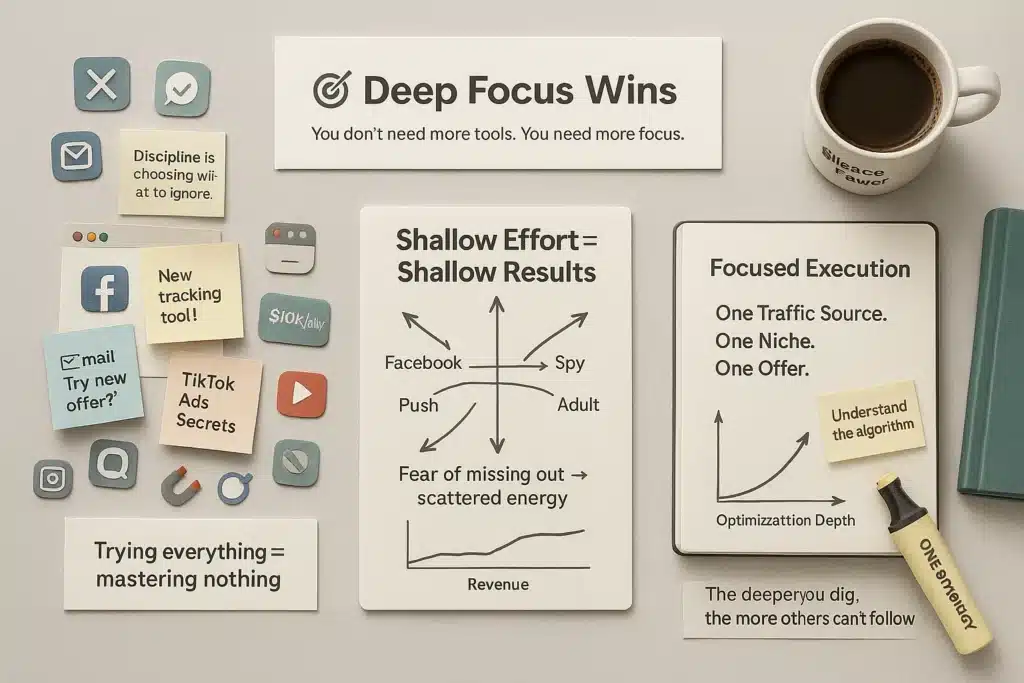
The Power of Focus: What Separates Top Affiliates from the Rest
In all my years in affiliate marketing, there’s one trait I’ve consistently seen in the top performers: Unshakable focus.
They’re not necessarily smarter.
They don’t always have bigger teams or fancy tools.
But when they work — they really work.
Laser focus. No noise. No half-measures.
Affiliate marketing is full of distractions.
You sit down to work — and Telegram’s buzzing about a new tracking tool.
Someone just posted a $10K/day screenshot on Facebook.
Your affiliate manager just emailed you a new offer to test.
You’ve got a YouTube tab open explaining TikTok Ads strategies.
And your brain starts spinning:
“Maybe I should learn that too.”
“I should test this new angle.”
“If others are doing it, I probably should…”
Suddenly, you’re doing everything — but finishing nothing.
I’ve been there.
I once tried to “diversify” my traffic strategy:
Running Facebook Ads, testing Native, trying push traffic, even spying on adult campaigns — all because I was afraid of putting all my eggs in one basket.
Sounds logical, right?
But here’s the truth:
I made just enough money to survive — never enough to scale.
Every campaign felt like a test.
Nothing felt stable.
No system was strong enough to build on.
Then I changed everything.
I picked one path — and went all in.
One traffic source.
One niche.
One offer type.
And that’s when I started seeing things no beginner ever notices.
I began to understand the algorithm.
I understood the market.
I picked up on user behavior.
I optimized campaigns in ways no one else could copy — because the insights were earned, not guessed.
That’s the power of focus.
Focus isn’t just “turning off Facebook.”
Focus is saying no to the noise — even when it’s shiny, even when it works for someone else.
It’s hard.
But if you want to rise to the top, you can’t chase every shiny object.
You have to choose — and go deep.
The deeper you go, the more you’ll see things others never will.
And that’s when you start pulling ahead.
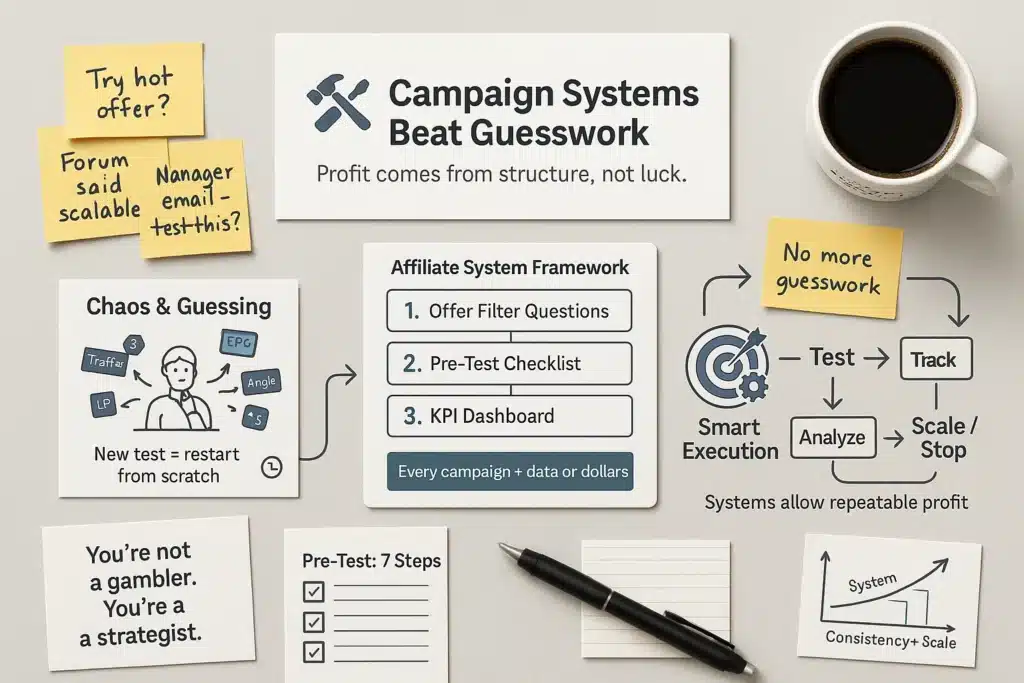
Why You Need a Repeatable System to Win in Affiliate Marketing
One of the most common questions beginners ask me is:
“How do you know if a campaign will be profitable?”
The honest answer?
You don’t.
No one does.
But top affiliates have something others don’t:
A system.
Most beginners operate on emotion.
A forum says this offer is hot? They test it.
Their affiliate manager emails a new offer? They test it.
A friend shares a scaled campaign screenshot? They test that too.
Every time, they start from scratch:
Guess the angle.
Guess the funnel.
Guess the traffic.
Guess everything.
That’s not marketing — that’s gambling.
Super Affiliates don’t guess.
They don’t reinvent the wheel for every new campaign.
They build systems — so every test has structure, logic, and a repeatable process.
A simple system might include:
- An offer vetting checklist: Is this niche traffic-friendly? What’s the average EPC? Are there case studies?
- A pre-test setup list: Is the angle defined? Landing page ready? Tracking configured?
- A short-term KPI tracker: After spending $100, what CTR is acceptable? What CPC is sustainable? What CR justifies scaling?
I don’t run campaigns just to “see what happens.”
I run with purpose:
Either I make money — or I learn something that makes me money next time.
And it all starts with a system — a framework that guides how I test, optimize, and decide.
No one can predict which campaign will be a winner.
But with a solid system, you can:
- Test faster than most.
- Know when to cut and when to scale.
- Understand why a campaign failed — and turn that into a lesson.
That’s not luck.
That’s a skill — systematized.
And once you have that system, you can create profit again and again — campaign after campaign.
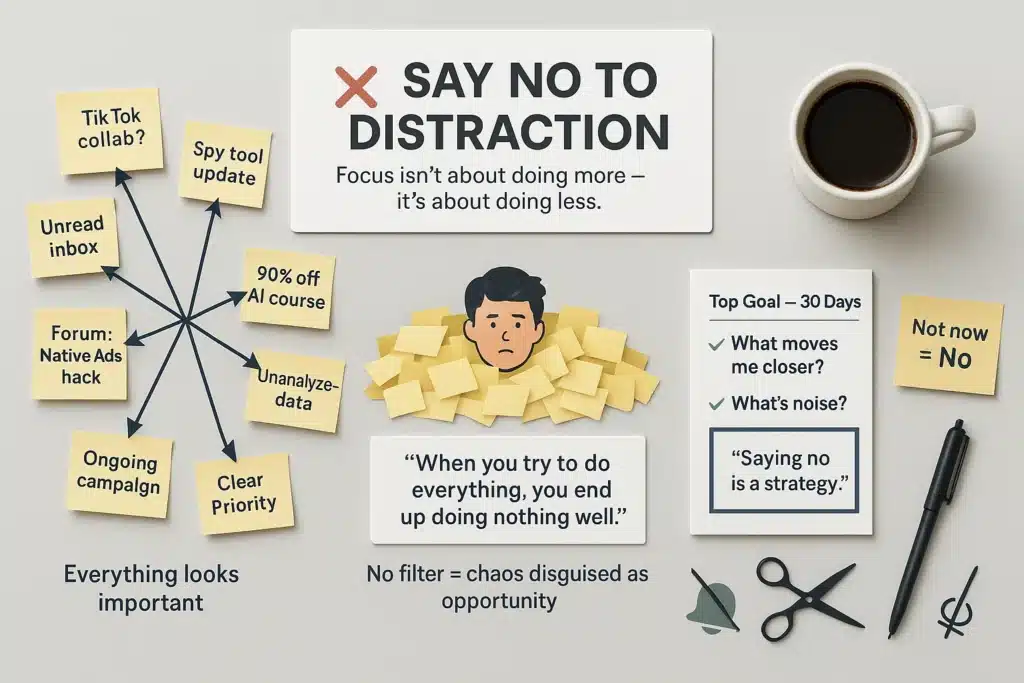
The Skill of Saying No: Eliminate What Slows You Down
Affiliate marketing isn’t hard because you lack ideas.
It’s hard because you can’t do everything.
Some days, I open my laptop and feel like I’m being pulled in eight directions at once:
- A campaign waiting to be optimized
- An affiliate manager pushing three new high-commission offers
- A forum post revealing a “secret” Native Ads strategy
- A friend inviting me to team up on TikTok lead gen
- A spy tool with shiny new features
- An AI course flashing a 90% discount
- A pile of data from yesterday still untouched
- And an inbox begging for replies
Everything feels important. But if you don’t choose — everything will steal your time.
Being good isn’t about doing more.
It’s about doing what matters most.
I’ve seen affiliates launch their first profitable campaign — only to lose focus right after.
They start testing too many things.
They take advice from everyone.
They get distracted by the next “hot opportunity.”
And they forget what was already working.
I follow a simple rule:
If something doesn’t serve my main goal right now — I cut it.
No hesitation.
Even if it’s tempting.
Even if others are making money with it.
Even if it might be useful someday.
Because I’ve learned:
If I try to do everything, I end up doing nothing well.
You don’t need another strategy.
You need a clear priority list.
Ask yourself:
- What’s the single most important goal for the next 30 days?
- What tasks actually move me toward that goal?
- What tasks just make me feel busy?
Saying “no” is a skill.
And it’s just as valuable as knowing how to execute.
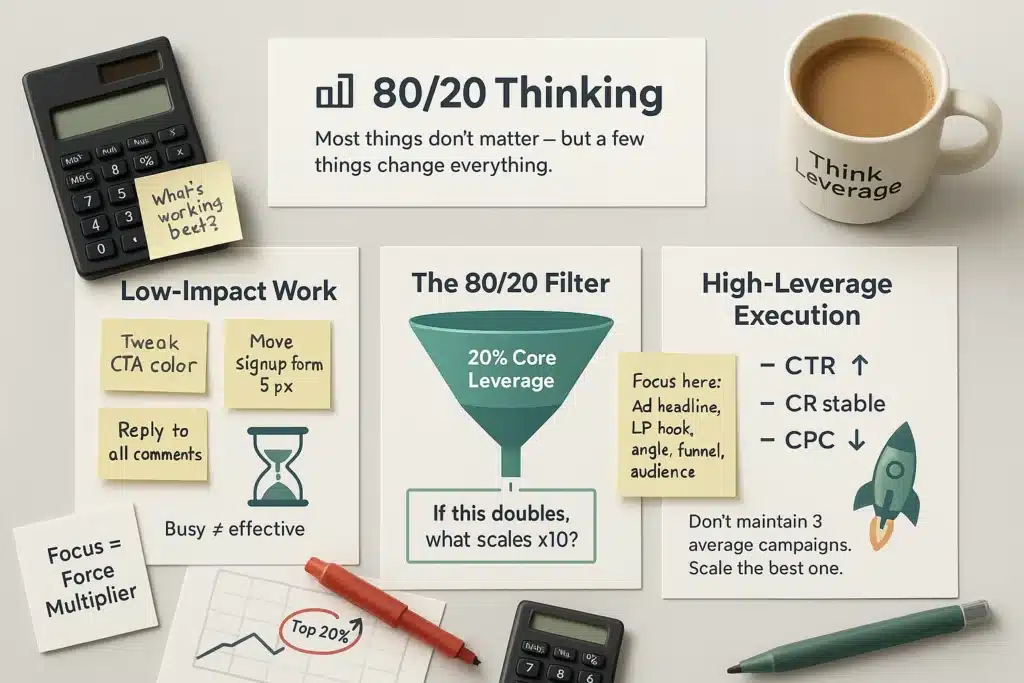
Use the 80/20 Rule to Maximize Results with Less Effort
You’ve heard it before:
80% of your results come from 20% of your efforts.
Sounds familiar, right?
But here’s the truth:
Very few people actually live by it.
They know it — but they don’t use it.
In affiliate marketing, 80% of your profits often come from a small handful of things:
- A few campaigns
- A few traffic sources
- A few offers
- A few key optimizations
But instead of doubling down on what’s working, most people divert.
They think: “I should test more. Try more. Do more.”
And that’s when results start to stall.
Let’s say you’re running three affiliate campaigns.
Each one is mildly profitable — maybe $50 to $100 per day.
You could keep all three going. Tweak each one a bit. Stay stable.
But look closer.
One of those campaigns has real potential:
Strong CTR.
Solid conversion rate.
CPC dropping.
That’s your winner.
Now comes the decision:
Do you keep everything mediocre — or focus all your energy on the one campaign that could explode?
Applying 80/20 means you’re willing to let go of the average, so you can multiply what’s exceptional.
I don’t waste hours tweaking minor design details.
I don’t obsess over button colors or whether a form should be 10 pixels to the left.
Instead, I focus on the elements that actually move the needle:
- Ad headlines
- Offer angles
- Landing page hooks
- Targeting
- Conversion funnels
And whenever I feel overwhelmed, I pause and ask:
- What 20% is driving most of my results?
- What, if improved just 2x, could increase my profits 10x?
- What’s eating up time — but giving me nothing back?
The 80/20 mindset isn’t a hack.
It’s a compass — one that keeps you from drowning in busywork.
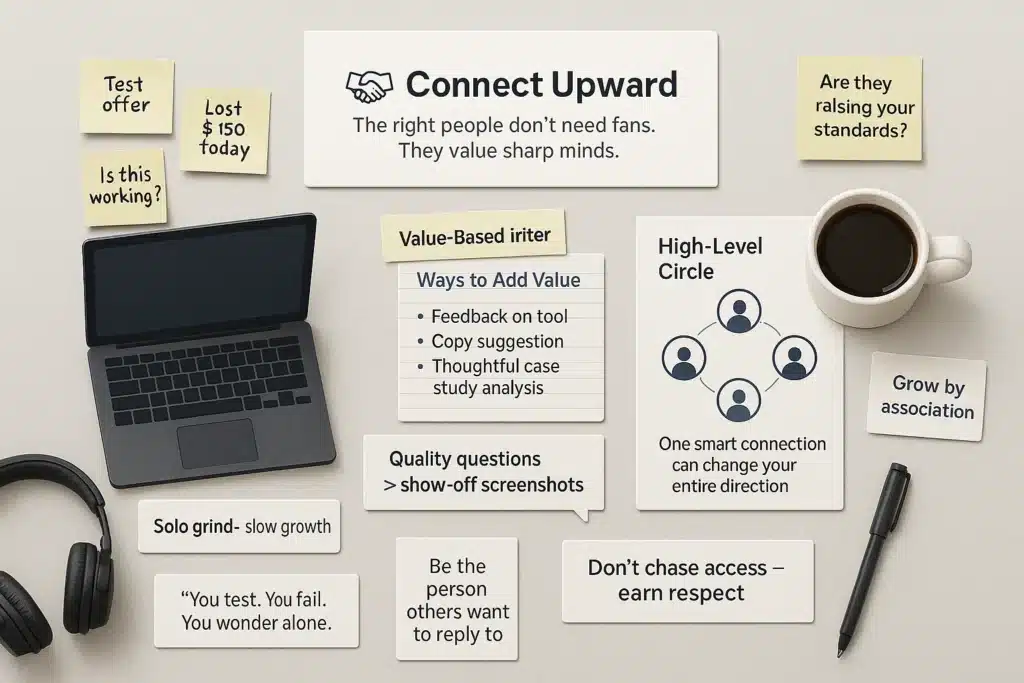
How the Right People Can 10x Your Affiliate Growth
I used to think:
“I’m not experienced enough. I haven’t achieved anything big — do I even deserve to connect with top affiliates?”
If you’re just starting out in affiliate marketing, you’ve probably felt the same.
Worried you’ll be judged.
Afraid of getting ignored.
But here’s what I learned:
Value isn’t just measured in dollars or experience.
It can come from the way you think.
The questions you ask.
The attitude you bring to each conversation.
Don’t try to get close to someone making $10K/day by asking:
“Can you share your campaign?”
Instead, start small:
- Help them test a new tool and give thoughtful feedback
- Offer suggestions to improve a headline or landing page
- Share your insights after reading a case study or running your own experiments
When you approach people with genuine curiosity and respect, they notice.
Top performers don’t need fans — they need thinkers.
People who keep their word.
People who understand the unspoken rules of the game.
Affiliate marketing can be lonely.
You test campaigns alone.
You fail alone.
You doubt yourself — then push forward… still alone.
But when you find the right community — even just one or two like-minded people — the journey becomes clearer, and far less cold.
I’m not saying you need to become the smartest person in the room.
But I am saying: be intentional about the room you’re in.
If you surround yourself with people who constantly complain, blame, and wait for the “next hot offer”… growth will be hard.
But if you spend time with those who think sharper, move faster, and hold higher standards — your level will rise naturally.
And one day, you may become the person others look up to.
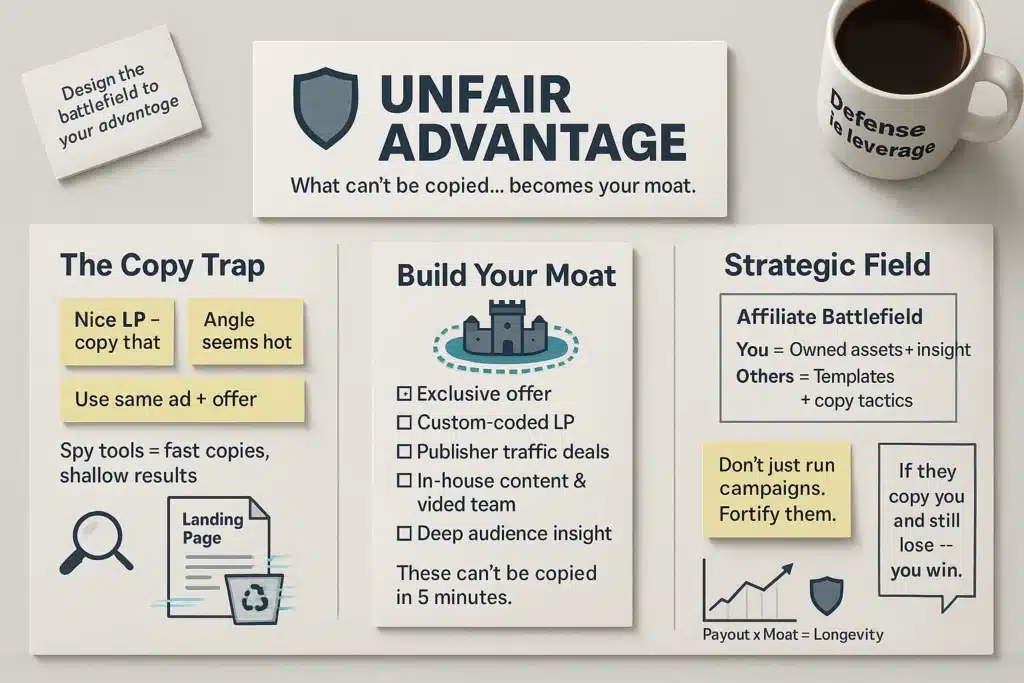
Build an Uncopyable Advantage in Affiliate Marketing
Here’s a truth no one talks about in affiliate marketing:
The moment you start making money — someone will try to copy you.
You design a high-converting landing page.
You write an ad that crushes.
You test a new angle that prints conversions.
As soon as you begin to scale, spy tools will rip everything within minutes.
Your landing page?
Your ad copy?
Even the offer?
Cloned.
And that campaign you spent weeks optimizing?
It might get undercut and die overnight.
I don’t blame the people copying.
I’ve learned a ton myself by analyzing others’ campaigns.
But if you want to survive long-term in affiliate marketing, you need one thing: A competitive edge they can’t steal.
You need an advantage.
You need a moat — a deep trench around your castle.
In affiliate marketing, that moat isn’t a secret firewall or hidden tool.
It’s the kind of edge that makes it hard — or nearly impossible — for others to replicate your success.
Here’s what that might look like:
- Working directly with advertisers for exclusive offers and better payouts
- Building custom-coded landing pages — not generic templates
- Buying traffic directly from publishers instead of public ad networks
- Crafting ad angles based on real user insight — not recycled forum trends
- Hiring an internal team to handle content, videos, A/B testing, and rapid launch cycles
I’ve seen great affiliates lose everything to copycats.
Not because they lacked skill — but because they had nothing protecting their campaigns.
They used public offers.
Spyable ads.
Free, overused landing page templates.
And traffic sources that everyone has access to.
And then they’re shocked when their winning campaign suddenly tanks.
Here’s the thing:
You can’t stop people from copying you.
But you can make their copy worthless.
That’s when you realize:
Super Affiliates don’t have more hours than you.
They just design the battlefield — so they’re always fighting on their own terms.
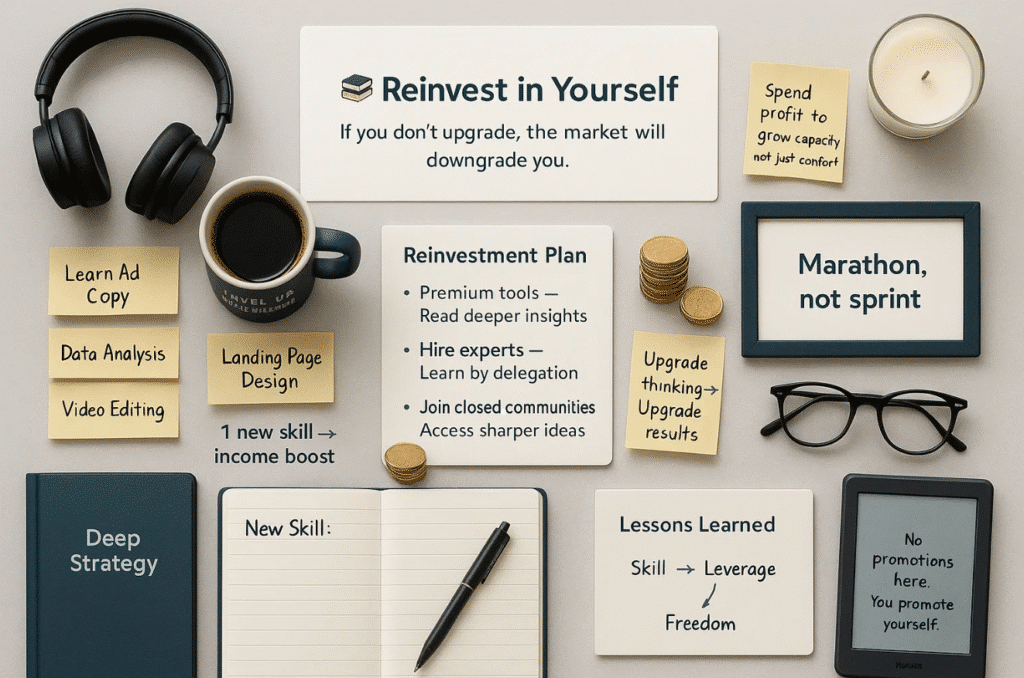
Reinvesting in Yourself: The Only Way to Stay Ahead Long-Term
Many affiliates hit a stable income level — and then… they stall.
Not because they’ve reached their limit.
But because they stop upgrading themselves.
They’re profitable — but spend the profits instead of reinvesting.
They learn a few tactics — but never dive into strategy.
They stick with the same tools, same methods, same mindset — and somehow expect different results.
But in this game, you can’t stand still.
I’m not saying you need to constantly chase new tools, traffic sources, or trends.
I’m saying: take a deliberate portion of your profits — and reinvest it in your own growth.
That could mean:
- Learning a new skill: writing ad copy, analyzing data, building landing pages, editing videos
- Hiring someone better than you in one area — and learning from them
- Paying for premium tools that save time and give deeper insights
- Joining high-level (even paid) communities where the conversations are sharper
- Reading books — slowly, intentionally, and with reflection
Affiliate marketing doesn’t come with promotions.
No one taps you on the shoulder and says, “Time to level up.”
That’s on you.
And if you don’t do it — the market will do it for you…
By leaving you behind.
I follow a simple rule:
Every year, I must learn a new skill — and make money with it.
It might be launching ads on a new platform.
Or learning email marketing.
Hiring and managing a team.
Or even just improving how I handle money.
Whatever it is — it makes me a stronger player in this game.
You don’t have to be great from the start. That’s okay.
But if 6–12 months go by and you’re still the exact same version of yourself — don’t be surprised when your campaigns don’t grow either.
Affiliate marketing isn’t a sprint.
It’s a long-distance marathon — one that rewards endurance, adaptability, and the willingness to evolve.
A Few Final Thoughts…
Some people get into affiliate marketing to earn a little extra income.
Some do it to escape the 9-to-5 grind.
And then there are others — like me — who stay longer because they see it for what it truly is:
A game that’s not easy, but real.
A game where every dollar earned, every mistake made, every seemingly small decision — is yours to own.
No one else takes the blame.
No one else pays the price.
And because of that, no one can stop you from getting better every single day.
If you’re still in the early stages — testing, failing, starting over — that’s okay. We all began there.
But if you want to go far, start building the skills that real Super Affiliates have:
Not just ad tricks — but the way they think.
Not just tactics to win — but systems to win again and again.
Not just doing more — but doing what matters, and doing it long enough to create lasting change.
Eventually, you won’t need to ask,
“How do I succeed?”
Because the way you operate… will be the answer.

